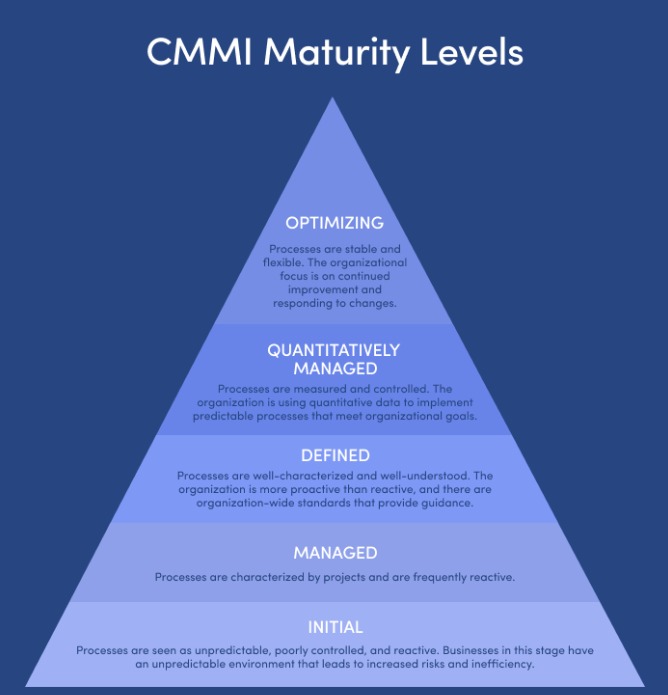CMMI Level 3 Companies
CMMI Level 3 Companies: Building Process Excellence
The modern business and fast-paced IT landscape has forced organizations to seek out means and methods of enhancing efficiency, compacting operations, and upholding the quality factor uniformly. Among the many approaches to achieving this, CMMI Level 3 companies stand out as true exemplars of process maturity and capability. Following the model of Capability Maturity Model Integration (CMMI) in their development, these organizations are not mainly concerned with delivering a project but with developing scalable processes with the prospect of achieving a sustainable success.
What is the CMMI Framework?

CMMI or Capability Maturity Model Integration is a process improvement model that has been adopted globally and has been created by the Software engineering institute (SEI). It aims at assisting organizations to become better in the management of projects, development of products and provision of services. The model is categorized into various levels of maturity with each level reflecting the capacity of the organization to organize and streamline its processes:
- Level 1 – Initial: Processes are unpredictable and reactive.
- Level 2 – Managed: Basic project management structures are in place.
- Level 3 – Defined: Processes are standardized and recorded throughout the company.
- Level 4 – Quantitatively Controlled: Processes are quantitatively measured and managed.
- Level 5 – Optimizing: A continuous process improvement culture.
Of these levels, CMMI Level 3 is among the most popular certifications that create established standardized processes within the organization.
Why Do CMMI Level 3 Companies Matter?
The contemporary business world requires stability, conformity and quality services. This is where CMMI Level 3 companies play a crucial role. They will show their clients, partners, and stakeholders, their processes are documented, repeatable, and efficient. The organizations on this level do not use individual performance exclusively but organize it into a system that helps to provide stability in the long run.
Standardization: Each project adheres to a documented organization wide set of processes.
Stability in performance: Clients will be assured of the ability to receive the same level of quality across several projects.
Less risks: Well-defined structures decrease the risks of project failures.
Credibility in the market: Certification is evidence of process maturity.
Characteristics of CMMI Level 3 Companies
- To note the rationale behind certification level 3 being a benchmark, we will consider the defining features of such organizations:
- Documented procedures: The company has developed project performance standards, quality control, and monitoring standards.
- Application organization by: This means that practices are not applied only on a project by project basis.
- Culture of knowledge sharing: The culture captures best practices and lessons learned that are often shared and contributed to the system.
- Jurisdiction cross-functional: Technological teams, business and quality managers operate on the same platform.
- This brings confidence to both the employees and clients that the organization is carrying out its operation with a lot of efficiency and maturity.
Benefits of Working with CMMI Level 3 Companies
The clients in the contemporary world are not as concerned about cost efficiency when selecting the vendors or the service providers but with stability and the level of expertise. Collaboration with an organization of Level 3 certification will provide several advantages:
- Increased Quality Deliverables: With the best practices written down, the clients get the end product that is of high quality and is consistently the same.
- Better Risk Control: These businesses actively define potential risks and develop an in-depth mitigation strategy.
- Greater Clients confidence: Certification fosters trust, particularly when the project involves a contract or a government initiative.
- Increased Employee Productivity: With the defining of the processes, the employee does not need to spend as much time getting clarifications but can focus more on delivering results.
- Whether they are IT software companies, IT services providers, or consultants, companies are choosing CMMI- certified partners to ensure predictable dates.
CMMI Level 3 Companies in the Global Landscape
Various industries around the globe embrace CMMI with no exception than the IT services and product based companies. CMMI Level 3 certification is a common requirement to compete on international projects in markets such as North America, Europe and India. This accreditation is a distinguishing factor applied by major outsourcing and consulting firms to compete against one another.
Countries such as India and the Philippines that are important locales in IT outsourcing are particularly allotted with firms that possess this certification. Other notorious entities involve mid-sized IT development firms, technology consultancies, and government projects handling firms. These companies receive not only opportunities within the global outsourcing ecosystem but also apply Level 3 status as an indicator of structural maturity.
The Process of Level 3 Certification for Companies.
It does not take a short time to become a CMMI Level 3 organization. The process includes the obligation to develop processes, documentation, and strict audits. Steps typically include:
- Gap Analysis: Searching where the organization is less efficient than the CMMI standards.
- Process Development: Developing structures that support the objectives of the organization, but also meet certification requirements.
- Training and Awareness: Maintaining the awareness and adherence to all the employees as to standardized practices.
- Internal Audits: Checking preparedness by conducting routine internal audits.
- Official Appraisal: While the certified assessors go through the processes and compliance.
In the case of most businesses, the process itself changes the way they operate internally and has greater benefits than certification itself.
Case Studies: CMMI Level 3 Organization Success.
Enhanced success in a technology solutions provider occurred following certification at Level 3. The new standardized processes, which were used after the implementation of CMMI, had reduced their average delivery times by over 25, which were previously plagued by delays in the project and excessively high costs. It also resulted in long-term contracts as the client satisfaction swelled.
CMMI level 3 was utilized by a government contracting firm in Asia to open up its international bid market. Having recorded quality systems they could demonstrate the adherence to international standards to get more lucrative contracts.
CMMI vs other Process Certifications.
Although ISO certifications are used by many organizations in the context of quality management, there are certain specific benefits of CMMI certification:
Feature CMMI Level 3 Companies ISO-Certified Companies
Focus Process Maturity & Improvement Quality Compliance.
Strategy Enhancement within organization Specific standard emphasis.
Result Standardized and predictable project delivery Audited quality procedures.
International Application Widely accepted in IT and consulting Applied industry wide.
This analogy explains why CMMI remains very unique in those industries needing a high level of process maturity.
Future of CMMI Level 3 Companies
With more industries becoming digitalized, the necessity to organize operations grows. CMMI Level 3 companies are being seen as critical partners in areas such as:
- Cloud services management
- Cybersecurity compliance
- Solution architecture built upon agile.
- Governance of AI and machine learning projects.
As companies start to focus on responsibility and long-term business planning, the importance of Level 3 certification will only increase over time.
The Right CMMI Level 3 Partner How-How.
Some tips to be provided to clients who seek to engage in partnership with certified companies are:
- Examine the scope and validity of the company certification.
- Evaluate the alignment of their processes to your project needs.
- Research previous case studies or client testimonials to get proven past outcomes.
- Make sure that they offer more than mere compliance to the partnership, actual added value.
These are measures that would facilitate in ensuring that the partnership achieves the intended business effects.
Conclusion
In an environment where consistency, compliance, and streamlined delivery matter more than ever, CMMI Level 3 companies emerge as trusted partners for businesses seeking growth. Along with setting new standards of quality and performance in industries, they reduce risks through standardized processes. In need of any of the above either IT outsourcing, project management and consultancy partnership, you are guaranteed that by aligning with such certified organizations, your investments will have guaranteed successful outcomes.
